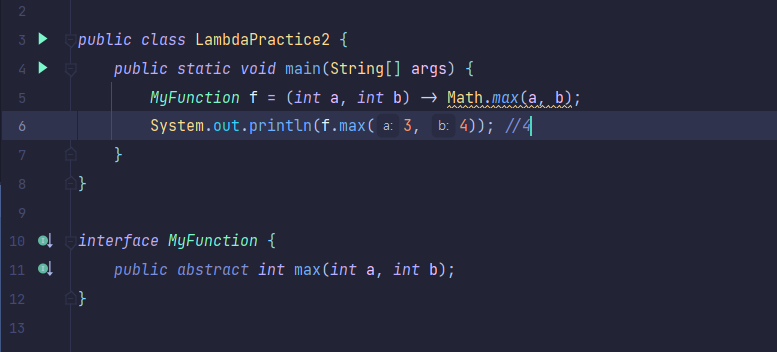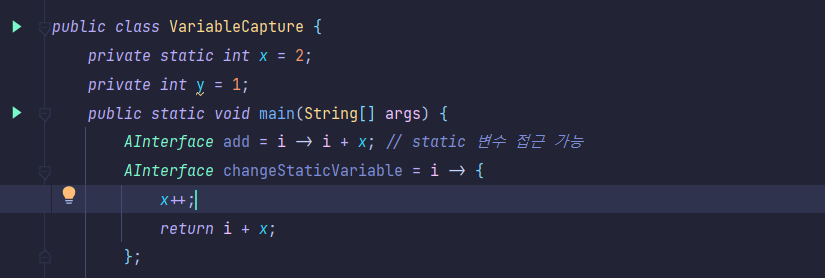학습 1) 람다식 사용법
람다식
https://docs.oracle.com/javase/tutorial/java/javaOO/lambdaexpressions.html
- 익명 클래스가 메서드 한 개만 갖고 있고 그 메서드조차 너무 심플할 때 이 메서드를 그 메서드 자체로 다른 메서드의 인자로 넘겨주고자 할 때 람다식을 사용한다. 그러니까 람다식은 단일 메소드를 가진 클래스를 더 압축적으로 표현하게 해준다.
- 자바의 정석에 따르면 람다식은 메서드를 하나의 식으로 표현한 것. 메서드를 람다식으로 표현하면 메서드의 이름과 반환 값이 없어져 익명 함수(anonymous function)이라고 표현한기도 한다.
//자바의 정석 코드
int[] arr = new int[5];
Arrays.setAll(arr, (i) -> (int) (Math.random() * 5) +1);
int methond(int i) {
return (int) (Math.random() * 5) +1);
}- 자바의 정석에 보면 람다는 익명 함수라기 보다는 사실 익명 클래스의 객체라고 한다. (위에 독스에서도 (익명 클래스의 메서드가 단순할 때 람다를 쓴다는 말에서) 익명 클래스를 강조했다고 느꼈다)
(int a, int b) -> a > b ? a : b
// 사실 아래 익명 클래스 객체와 같다.
new Object() {
int max(int a, int b) {
return a > b ? a : b;
}
}- https://www.baeldung.com/java-8-functional-interfaces 자바 8부터 람다로 엄청난 변화를 가져왔다. 람다로 메소드에 제공하거나 람다를 return 할 수 있게 되면서 익명 함수를 일급 객체로 사용할 수 있게 된 것에서 의미가 크다. 어떻게 이를 메서드에 제공하고 return 하는지는 아래에서 알아보도록 하자.
람다식 사용법
- 자바의 정석
- 메서드에서 이름과 반환 타입을 제거하고 매개변수 선언부와 몸통{} 사이에
->를 추가하면 된다.
int max(int a, int b) {
//수행 내용
}
(int a, int b) -> {
//수행 내용
}- 반환값이 있는 메서드라면 return 문 대신 식 자체가 메서드가 된다.
- 식의 연산 결과가 자동으로 반환 값이 된다. 문장이 아니라 식이기 때문에
;를 붙이지 않는다. - return을 붙이는 형태도 가능 하다.
- 식의 연산 결과가 자동으로 반환 값이 된다. 문장이 아니라 식이기 때문에
int add(int a, int b) {
return a + b;
}
(int a, int b) -> a + b
(int a, int b) -> {
return a+b;
}- 람다식에 선언된 매개변수 추론이 가능한 경우는 생략할 수 있다. (대부분의 경우에 생략가능)
//생략 전
(int a, int b) -> a > b ? a : b
//생략 후
(a, b) -> a > b ? a : b - 선언된 매개변수가 하나라면 괄호() 를 생략 할 수 있다.
//생략 전
(a) -> a * 2
//생략 후
a -> a * 2- 매개변수에 선언된 타입이 있으면 생략 불가
//() 생략 불가
(int a) -> a * 2 { }안에 문장이 한 개라면 생각 가능, return문일 경우 생략 불가
(int a, int b) -> {a+b;}
//생략 후 ( ; 를 붙이지 않기!)
(int a, int b) -> a + b
(int a, int b) -> {return a+b;}
//에러. 불가한 코드.
(int a, int b) -> return a+b;
학습 2) 함수형 인터페이스
함수형 인터페이스가 왜 필요한지?
위에서 람다식은 사실 익명 클래스의 객체라고 했다. 이 친구를 받아줄 때 타입과 변수로 받아줘야 할 것이다. 이 때 필요한 것이 함수형 인터페이스
https://docs.oracle.com/javase/tutorial/java/javaOO/lambdaexpressions.html#approach6
interface CheckPerson {
boolean test(Person p);
}- 이 인터페이스는 너무 간단해서 따로 정의하기가 애매하다. 그래서 JDK는 몇몇 표준 함수형 인터페이스들을 제공하고 있다.
interface Predicate<T> {
boolean test(T t);
}- 실제로
Predicate<T>를 호출하면 아래와 같이 오버라이딩 하라고 자동 완성된다

- 저기서
new Predicate<Integer>한 부분이 인터페이스를 구현한 익명 클래스의 객체를 생성한 것이다. - 이 익명 객체를 이제 변수로 받았으니 쉽게 호출 할 수 있다.

- 위의 함수형 인터페이스를 구현하는 것을 람다식으로도 할 수 있다. 람다식도 사실 익명 객체이기 때문

- 이렇게 되면 람다식을 다룰 참조변수가 만들어 진 것이다. 이런 인터페이스는 함수형 인터페이스이다.
함수형 인터페이스란
https://www.baeldung.com/java-8-functional-interfaces
- 함수형 인터페이스란 단 하나의 추상 메서드를 가진 인터페이스이다.
- 위에서 본 것처럼 함수형 인터페이스 구현은 람다를 통해 가능하다.
- 어노테이션
@FunctionalInterface을 사용한다.- https://docs.oracle.com/javase/specs/jls/se8/html/jls-9.html#jls-9.6.4.9 에 따르면 이는 함수형 인터페이스를 나타내기 위해 사용한다. 부적절한 메소드 선언을 잡아낸다. 그러나 반드시 모든 함수형 인터페이스에 이 어노테이션을 붙여야 하는 것은 아니라고 한다.
- 실제로 어노테이션을 안붙여도 잘 작동한다

- (자바의정석) 함수형 인터페이스의 메서드와 람다식의 매개변수 개수와 반환 타입이 일치해야 한다.
함수형 인터페이스 : 메서드를 통해 람다식을 주고 받을 수 있다.
파라미터로 전달
- 이런식으로 함수형 인터페이스를 파라미터로 전달받는 메서드가 있다고 했을 때
 이런식으로 람다식을 참조하는 참조변수를 매개변수로 지정해야 한다.
이런식으로 람다식을 참조하는 참조변수를 매개변수로 지정해야 한다.  아니면 람다식을 인자로 넣는 직접 넣는 것도 가능하다.
아니면 람다식을 인자로 넣는 직접 넣는 것도 가능하다. 
return으로 받기
- 반환 타입으로 함수형 인터페이스를 선언하면 구현해야 하는 메서드를 람다로 직접 return 할 수 있다.

- 이렇게 메서드를 변수처럼 주고 받는 것이 가능하고, 익명 함수를 일급 객체로 사용할 수 있게 된 것에서 의미가 크다고 한다. 실제로는 메서드가 아니라 익명 객체를 주고 받는 것이지만 코드가 훨씬 간결해진 장점이 있다.
학습 3) Variable Capture
- 람다식 내부에서 람다식 외부에 선언된 변수에 접근 할 수 있는 것
- static 변수, 인스턴스 변수, 지역 변수에 접근가능하다.
- 람다 안에서 사용되는 지역변수, 파라미터로 넘어오는 변수는 final 이어야 한다.
- 좀 더 엄밀히 얘기하면 지역변수는 fianl, effectively final 이어야 한다. https://www.geeksforgeeks.org/java-lambda-expression-variable-capturing-with-examples/ 에 따르면 effectively final은 final로 선언되지 않았지만 할당 된 이후에 바뀌지 않아야 하는 것이라고 한다.
- 그렇기 때문에 static 변수, 인스턴스 변수는 람다식 내에서 변경이 가능하나 지역변수는 변경하지 못한다.
- 다음은 static 변수를 변경한 예

- https://www.notion.so/758e363f9fb04872a604999f8af6a1ae 를 참고하여 왜 final이어야 하는지 좀 더 자세히 설명을 적으면 이는 인스턴스 변수나 static 변수는 힙 영역에 위치해 모든 쓰레드가 공유하기 때문에 변경이 가능한 것
- 그러나 지역변수는 스택영역에 있다. 메소드 내부에서 새로운 객체를 생성했을 때(힙영역) 이 객체가 메서드 내부의 지역변수나 매개변수를 사용할 경우 스택 영역에 있던 이들은 없어졌을 수도 있다. 그래서 컴파일 시점에 메소드 매개변수나 지역변수를 메서드 내부에서 생성된 객체가 사용할 경우 이 값들을 복사해서 사용하는데, final이거나 effectively final인 값만 복사하여 사용. 이 것이
variable capture이다. final 이고 final 처럼 사용해야 되기 때문에 위에서 말한 것처럼 람다식 내부에서 지역변수를 변경하지 못한다.
package bongf.week15.study;
import java.util.Arrays;
public class VariableCapture {
private static int x = 2;
private int y = 1;
public static void main(String[] args) {
AInterface add = i -> i + x; // static 변수 접근 가능
AInterface changeStaticVariable = i -> {
x++;
return i + x;
};
int a = 1;
for (int i = 0; i < 5; i++) {
a++;
}
int[] test = new int[]{1, 2, 3};
// Arrays.stream(test).map(x -> x + a).getAsInt(); //에러. final이 아니다.
}
public void accessInstanceVariable() {
AInterface subtract = i -> i - y; // 인스턴스 변수 접근 가능
AInterface subtract2 = i -> {
y--; // 지역변수가 아니기 때문에 변경 가능하다.
return i - y; // 인스턴스 변수 접근 가능
};
}
public static void accessLocalVariable() {
int z = 1;
AInterface divde = i -> i / z; // 로컬변수 접근 가능
AInterface notFianl = (int x) -> {
// z = z*z; //에러 effectively final이기 때문에 변경할 수 없다.
return z;
};
}
}
@FunctionalInterface
interface AInterface {
int operate(int x);
}
- 위의 스트림 사용한 람다의 에러 화면. 스트림 쓸 때 종종 마주했다.

- 아래는 이런 Variable Capture 을 잘 정리해 둔 것 같아 docs tutorial 에서 가져 온 후 설명을 추가했다.
package bongf.week15.study;
import java.util.function.Consumer;
public class LambdaScopeTest {
public int x = 0;
class FirstLevel {
public int x = 1;
void methodInFirstLevel(int x) {
int z = 2;
// 여기서 y대신 x나, z로 바꾸면 에러 난다.
// "Lambda expression's parameter x cannot redeclare another local variable defined in an enclosing scope"
// 외부함수의 범위(enclosing scope)에서 정의된 지역 변수 x를 재 정의 할 수 없다.
// 람다는 람다를 감싸고 있는 메소드와 같은 스코프이기 때문에
// 이미 z나 x를 정의한 것으로 인식한다.
// 만약 이를 익명 클래스로 작성하면 에러가 발생하지 않는다.(아래 testShadowing) 익명 클래스는 쉐도잉 이슈가 있지만 람다는 없다.
// 자세한 내용은 https://www.notion.so/758e363f9fb04872a604999f8af6a1ae
Consumer<Integer> myConsumer = (y) ->
{
// The following statement causes the compiler to generate
// the error "Local variable z defined in an enclosing scope
// must be final or effectively final"
//
// z = 99;
System.out.println("x = " + x); // 23
System.out.println("y = " + y); // 23 매개변수로 넣어준
System.out.println("z = " + z); // 2
System.out.println("this.x = " + this.x); // 1
System.out.println("LambdaScopeTest.this.x = " +
LambdaScopeTest.this.x); //0
};
myConsumer.accept(x);
// 익명 클래스로 작성하면 'z'라고 써도 문제가 없다.
Consumer<Integer> testShadowing = new Consumer<Integer>() {
@Override
public void accept(Integer z) {
System.out.println(z);
}
};
}
}
public static void main(String... args) {
LambdaScopeTest st = new LambdaScopeTest();
LambdaScopeTest.FirstLevel fl = st.new FirstLevel();
fl.methodInFirstLevel(23);
}
}
학습 4) 메소드, 생성자 레퍼런스
- 출처 : 자바의 정석
메소드 참조 Method Reference
- 람다식이 하나의 메서드만 호출하는 경우 메서드 레퍼런스를 이용할 수 있다.
클래스이름::메서드이름혹은참조변수::메서드이름으로 바꿀 수 있다.
(x) -> ClassName.method(x)
(obj, x) -> obj.method(x)
(x) -> obj.method(x)
//메서드 참조 후
ClassName::method //클래스의 static 메서드 참조
ClassName::method //인스턴스 메서드 참조
obj::method //특정 객체의 인스턴스 메서드 참조 - 간편해서 스트림에서 종종 썼다.

생성자 참조
- 생성자를 호출하는 람다식도 메서드 참조로 변환할 수 있다.
() -> new AClass();
() -> AClass::new